
Secretary of State for War
Encyclopedia

United Kingdom
The United Kingdom of Great Britain and Northern IrelandIn the United Kingdom and Dependencies, other languages have been officially recognised as legitimate autochthonous languages under the European Charter for Regional or Minority Languages...
cabinet
Cabinet (government)
A Cabinet is a body of high ranking government officials, typically representing the executive branch. It can also sometimes be referred to as the Council of Ministers, an Executive Council, or an Executive Committee.- Overview :...
-level position, first held by Henry Dundas (appointed in 1794). In 1801 the post became that of Secretary of State for War and the Colonies
Secretary of State for War and the Colonies
The Secretary of State for War and the Colonies was a British cabinet level position responsible for the army and the British colonies . The Department was created in 1801...
. The position was re-instated in 1854. In 1946, with the creation of a cabinet level Minister of Defence
Minister of Defence (UK)
The post of Minister of Defence was responsible for co-ordination of defence and security from its creation in 1940 until its abolition in 1964. The post was a Cabinet level post and generally ranked above the three service ministers, some of whom, however, continued to also serve in...
separate from the prime minister, it ceased to be a cabinet position, and the office was abolished on 1 April 1964, when the cabinet position (along with that of First Lord of the Admiralty and Secretary of State for Air
Secretary of State for Air
The Secretary of State for Air was a cabinet level British position. The person holding this position was in charge of the Air Ministry. It was created on 10 January 1919 to manage the Royal Air Force...
) was replaced by the Secretary of State for Defence
Secretary of State for Defence
The Secretary of State for Defence, popularly known as the Defence Secretary, is the senior Government of the United Kingdom minister in charge of the Ministry of Defence, chairing the Defence Council. It is a Cabinet position...
- in charge of a new united Ministry of Defence
Ministry of Defence (United Kingdom)
The Ministry of Defence is the United Kingdom government department responsible for implementation of government defence policy and is the headquarters of the British Armed Forces....
.
The Secretary of State headed the War Office
War Office
The War Office was a department of the British Government, responsible for the administration of the British Army between the 17th century and 1964, when its functions were transferred to the Ministry of Defence...
and was assisted by a Parliamentary Under-Secretary of State for War
Under-Secretary of State for War
The position of Under-Secretary of State for War was a British government position, first applied to Evan Nepean . In 1801 the offices for War and the Colonies were merged and the post became that of Under-Secretary of State for War and the Colonies...
, a Parliamentary Private Secretary
Parliamentary Private Secretary
A Parliamentary Private Secretary is a role given to a United Kingdom Member of Parliament by a senior minister in government or shadow minister to act as their contact for the House of Commons; this role is junior to that of Parliamentary Under-Secretary, which is a ministerial post, salaried by...
who was also a Member of Parliament
Member of Parliament
A Member of Parliament is a representative of the voters to a :parliament. In many countries with bicameral parliaments, the term applies specifically to members of the lower house, as upper houses often have a different title, such as senate, and thus also have different titles for its members,...
, and a Military Secretary, who was a general
General
A general officer is an officer of high military rank, usually in the army, and in some nations, the air force. The term is widely used by many nations of the world, and when a country uses a different term, there is an equivalent title given....
.
Secretaries of State for War, 1794-1801
| Name | Portrait | Took office | Left office | Political party | |
|---|---|---|---|---|---|
| Henry Dundas Henry Dundas, 1st Viscount Melville Henry Dundas, 1st Viscount Melville PC and Baron Dunira was a Scottish lawyer and politician. He was the first Secretary of State for War and the last person to be impeached in the United Kingdom.... (also President of the Board of Control President of the Board of Control The President of the Board of Control was a British government official in the late 18th and early 19th century responsible for overseeing the British East India Company and generally serving as the chief official in London responsible for Indian affairs. The position was frequently a cabinet... ) |
 |
11 July 1794 | 17 March 1801 | Tory | |
For 1801-1854 see Secretary of State for War and the Colonies
Secretary of State for War and the Colonies
The Secretary of State for War and the Colonies was a British cabinet level position responsible for the army and the British colonies . The Department was created in 1801...
.
Secretaries of State for War, 1854-1964
| Name | Portrait | Took office | Left office | Political party | |
|---|---|---|---|---|---|
| The Duke of Newcastle |  |
12 June 1854 | 30 January 1855 | Peelite Peelite The Peelites were a breakaway faction of the British Conservative Party, and existed from 1846 to 1859. They were called "Peelites" because they were initially led by Sir Robert Peel, who was the British Prime Minister and Conservative Party leader in 1846.... |
|
| The Lord Panmure Fox Maule-Ramsay, 11th Earl of Dalhousie Fox Maule-Ramsay, 11th Earl of Dalhousie KT, GCB, PC , known as Fox Maule before 1852, as The Lord Panmure between 1852 and 1860 and as Earl of Dalhousie after 1860, was a British politician.-Background:... |
 |
8 February 1855 | 21 February 1858 | Whig | |
| Jonathan Peel Jonathan Peel Jonathan Peel was a British soldier, Conservative politician and racehorse owner.-Background and education:... |
26 February 1858 | 11 June 1859 | Conservative Conservative Party (UK) The Conservative Party, formally the Conservative and Unionist Party, is a centre-right political party in the United Kingdom that adheres to the philosophies of conservatism and British unionism. It is the largest political party in the UK, and is currently the largest single party in the House... |
||
| Sidney Herbert Sidney Herbert, 1st Baron Herbert of Lea Sidney Herbert, 1st Baron Herbert of Lea PC was an English statesman and a close ally and confidante of Florence Nightingale.-Early life:... |
18 June 1859 | 22 July 1861 | Liberal Liberal Party (UK) The Liberal Party was one of the two major political parties of the United Kingdom during the 19th and early 20th centuries. It was a third party of negligible importance throughout the latter half of the 20th Century, before merging with the Social Democratic Party in 1988 to form the present day... |
||
| Sir George Cornewall Lewis, Bt | 23 July 1861 | 13 April 1863 | Liberal Liberal Party (UK) The Liberal Party was one of the two major political parties of the United Kingdom during the 19th and early 20th centuries. It was a third party of negligible importance throughout the latter half of the 20th Century, before merging with the Social Democratic Party in 1988 to form the present day... |
||
| The Earl de Grey and Ripon George Robinson, 1st Marquess of Ripon George Frederick Samuel Robinson, 1st Marquess of Ripon KG, GCSI, CIE, PC , known as Viscount Goderich from 1833 to 1859 and as the Earl de Grey and Ripon from 1859 to 1871, was a British politician who served in every Liberal cabinet from 1861 until his death forty-eight years later.-Background... |
 |
28 April 1863 | 16 February 1866 | Liberal Liberal Party (UK) The Liberal Party was one of the two major political parties of the United Kingdom during the 19th and early 20th centuries. It was a third party of negligible importance throughout the latter half of the 20th Century, before merging with the Social Democratic Party in 1988 to form the present day... |
|
| The Marquess of Hartington Spencer Cavendish, 8th Duke of Devonshire Spencer Compton Cavendish, 8th Duke of Devonshire KG, GCVO, PC, PC , styled Lord Cavendish of Keighley between 1834 and 1858 and Marquess of Hartington between 1858 and 1891, was a British statesman... |
16 February 1866 | 26 June 1866 | Liberal Liberal Party (UK) The Liberal Party was one of the two major political parties of the United Kingdom during the 19th and early 20th centuries. It was a third party of negligible importance throughout the latter half of the 20th Century, before merging with the Social Democratic Party in 1988 to form the present day... |
||
| Jonathan Peel Jonathan Peel Jonathan Peel was a British soldier, Conservative politician and racehorse owner.-Background and education:... |
6 July 1866 | 8 March 1867 | Conservative Conservative Party (UK) The Conservative Party, formally the Conservative and Unionist Party, is a centre-right political party in the United Kingdom that adheres to the philosophies of conservatism and British unionism. It is the largest political party in the UK, and is currently the largest single party in the House... |
||
| Sir John Pakington, Bt John Pakington, 1st Baron Hampton John Somerset Pakington, 1st Baron Hampton GCB, PC FRS , known as Sir John Pakington, Bt from 1846 to 1874, was a British Conservative politician.-Background and education:... |
 |
8 March 1867 | 1 December 1868 | Conservative Conservative Party (UK) The Conservative Party, formally the Conservative and Unionist Party, is a centre-right political party in the United Kingdom that adheres to the philosophies of conservatism and British unionism. It is the largest political party in the UK, and is currently the largest single party in the House... |
|
| Edward Cardwell Edward Cardwell, 1st Viscount Cardwell Edward Cardwell, 1st Viscount Cardwell PC, PC , FRS was a prominent British politician in the Peelite and Liberal parties during the middle of the 19th century... |
 |
9 December 1868 | 17 February 1874 | Liberal Liberal Party (UK) The Liberal Party was one of the two major political parties of the United Kingdom during the 19th and early 20th centuries. It was a third party of negligible importance throughout the latter half of the 20th Century, before merging with the Social Democratic Party in 1988 to form the present day... |
|
| Gathorne Hardy |  |
21 February 1874 | 2 April 1878 | Conservative Conservative Party (UK) The Conservative Party, formally the Conservative and Unionist Party, is a centre-right political party in the United Kingdom that adheres to the philosophies of conservatism and British unionism. It is the largest political party in the UK, and is currently the largest single party in the House... |
|
| Frederick Stanley Frederick Stanley, 16th Earl of Derby Frederick Arthur Stanley, 16th Earl of Derby KG, GCB, GCVO, PC , known as Frederick Stanley until 1886 and as Lord Stanley of Preston between 1886 and 1893, was a Conservative Party politician in the United Kingdom who served as Colonial Secretary from 1885 to 1886 and the sixth Governor General... |
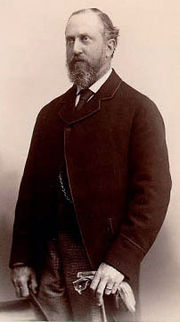 |
2 April 1878 | 21 April 1880 | Conservative Conservative Party (UK) The Conservative Party, formally the Conservative and Unionist Party, is a centre-right political party in the United Kingdom that adheres to the philosophies of conservatism and British unionism. It is the largest political party in the UK, and is currently the largest single party in the House... |
|
| Hugh Childers Hugh Childers Hugh Culling Eardley Childers was a British and Australian Liberal statesman of the nineteenth century. He is perhaps best known for his reform efforts at the Admiralty and the War Office... |
28 April 1880 | 16 December 1882 | Liberal Liberal Party (UK) The Liberal Party was one of the two major political parties of the United Kingdom during the 19th and early 20th centuries. It was a third party of negligible importance throughout the latter half of the 20th Century, before merging with the Social Democratic Party in 1988 to form the present day... |
||
| The Marquess of Hartington Spencer Cavendish, 8th Duke of Devonshire Spencer Compton Cavendish, 8th Duke of Devonshire KG, GCVO, PC, PC , styled Lord Cavendish of Keighley between 1834 and 1858 and Marquess of Hartington between 1858 and 1891, was a British statesman... |
16 December 1882 | 9 June 1885 | Liberal Liberal Party (UK) The Liberal Party was one of the two major political parties of the United Kingdom during the 19th and early 20th centuries. It was a third party of negligible importance throughout the latter half of the 20th Century, before merging with the Social Democratic Party in 1988 to form the present day... |
||
| W. H. Smith |  |
24 June 1885 | 21 January 1886 | Conservative Conservative Party (UK) The Conservative Party, formally the Conservative and Unionist Party, is a centre-right political party in the United Kingdom that adheres to the philosophies of conservatism and British unionism. It is the largest political party in the UK, and is currently the largest single party in the House... |
|
| The Viscount Cranbrook |  |
21 January 1886 | 6 February 1886 | Conservative Conservative Party (UK) The Conservative Party, formally the Conservative and Unionist Party, is a centre-right political party in the United Kingdom that adheres to the philosophies of conservatism and British unionism. It is the largest political party in the UK, and is currently the largest single party in the House... |
|
| Henry Campbell-Bannerman Henry Campbell-Bannerman Sir Henry Campbell-Bannerman GCB was a British Liberal Party politician who served as Prime Minister of the United Kingdom from 1905 to 1908 and Leader of the Liberal Party from 1899 to 1908. He also served as Secretary of State for War twice, in the Cabinets of Gladstone and Rosebery... |
 |
6 February 1886 | 20 July 1886 | Liberal Liberal Party (UK) The Liberal Party was one of the two major political parties of the United Kingdom during the 19th and early 20th centuries. It was a third party of negligible importance throughout the latter half of the 20th Century, before merging with the Social Democratic Party in 1988 to form the present day... |
|
| W. H. Smith |  |
3 August 1886 | 14 January 1887 | Conservative Conservative Party (UK) The Conservative Party, formally the Conservative and Unionist Party, is a centre-right political party in the United Kingdom that adheres to the philosophies of conservatism and British unionism. It is the largest political party in the UK, and is currently the largest single party in the House... |
|
| Edward Stanhope Edward Stanhope Edward Stanhope was a British Conservative Party politician.-Background and education:Born in London, Stanhope was the second son of Philip Stanhope, 5th Earl Stanhope, by his wife Emily Harriet, daughter of General Sir Edward Kerrison, 1st Baronet... |
14 January 1887 | 11 August 1892 | Conservative Conservative Party (UK) The Conservative Party, formally the Conservative and Unionist Party, is a centre-right political party in the United Kingdom that adheres to the philosophies of conservatism and British unionism. It is the largest political party in the UK, and is currently the largest single party in the House... |
||
| Henry Campbell-Bannerman Henry Campbell-Bannerman Sir Henry Campbell-Bannerman GCB was a British Liberal Party politician who served as Prime Minister of the United Kingdom from 1905 to 1908 and Leader of the Liberal Party from 1899 to 1908. He also served as Secretary of State for War twice, in the Cabinets of Gladstone and Rosebery... |
 |
18 August 1892 | 21 June 1895 | Liberal Liberal Party (UK) The Liberal Party was one of the two major political parties of the United Kingdom during the 19th and early 20th centuries. It was a third party of negligible importance throughout the latter half of the 20th Century, before merging with the Social Democratic Party in 1988 to form the present day... |
|
| The Marquess of Lansdowne Henry Petty-FitzMaurice, 5th Marquess of Lansdowne Henry Charles Keith Petty-Fitzmaurice, 5th Marquess of Lansdowne, KG, GCSI, GCMG, GCIE, PC was a British politician and Irish peer who served successively as the fifth Governor General of Canada, Viceroy of India, Secretary of State for War, and Secretary of State for Foreign Affairs... |
 |
4 July 1895 | 12 November 1900 | Liberal Unionist Liberal Unionist Party The Liberal Unionist Party was a British political party that was formed in 1886 by a faction that broke away from the Liberal Party. Led by Lord Hartington and Joseph Chamberlain, the party formed a political alliance with the Conservative Party in opposition to Irish Home Rule... |
|
| St John Brodrick St John Brodrick, 1st Earl of Midleton William St John Fremantle Brodrick, 1st Earl of Midleton, KP, PC , known as St John Brodrick until 1907 and as The Viscount Midleton between 1907 and 1920, was a British Conservative Party politician.... |
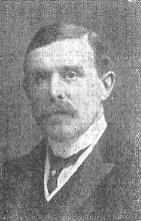 |
12 November 1900 | 6 October 1903 | Conservative Conservative Party (UK) The Conservative Party, formally the Conservative and Unionist Party, is a centre-right political party in the United Kingdom that adheres to the philosophies of conservatism and British unionism. It is the largest political party in the UK, and is currently the largest single party in the House... |
|
| H. O. Arnold-Forster | 6 October 1903 | 4 December 1905 | Liberal Unionist Liberal Unionist Party The Liberal Unionist Party was a British political party that was formed in 1886 by a faction that broke away from the Liberal Party. Led by Lord Hartington and Joseph Chamberlain, the party formed a political alliance with the Conservative Party in opposition to Irish Home Rule... |
||
| Richard Haldane Richard Haldane, 1st Viscount Haldane Richard Burdon Haldane, 1st Viscount Haldane KT, OM, PC, KC, FRS, FBA, FSA , was an influential British Liberal Imperialist and later Labour politician, lawyer and philosopher. He was Secretary of State for War between 1905 and 1912 during which time the "Haldane Reforms" were implemented... (Viscount Haldane from 1911) |
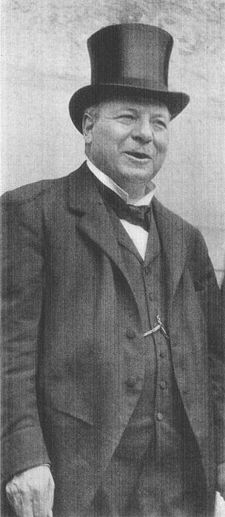 |
10 December 1905 | 12 June 1912 | Liberal Liberal Party (UK) The Liberal Party was one of the two major political parties of the United Kingdom during the 19th and early 20th centuries. It was a third party of negligible importance throughout the latter half of the 20th Century, before merging with the Social Democratic Party in 1988 to form the present day... |
|
| J. E. B. Seely J. E. B. Seely, 1st Baron Mottistone John Edward Bernard Seely, 1st Baron Mottistone CB, CMG, DSO, PC, TD was a British soldier and politician. He was a Conservative Member of Parliament from 1900 to 1904 and a Liberal MP from 1904 to 1922 and from 1923 to 1924... |
12 June 1912 | 30 March 1914 | Liberal Liberal Party (UK) The Liberal Party was one of the two major political parties of the United Kingdom during the 19th and early 20th centuries. It was a third party of negligible importance throughout the latter half of the 20th Century, before merging with the Social Democratic Party in 1988 to form the present day... |
||
| H. H. Asquith H. H. Asquith Herbert Henry Asquith, 1st Earl of Oxford and Asquith, KG, PC, KC served as the Liberal Prime Minister of the United Kingdom from 1908 to 1916... (while Prime Minister Prime Minister of the United Kingdom The Prime Minister of the United Kingdom of Great Britain and Northern Ireland is the Head of Her Majesty's Government in the United Kingdom. The Prime Minister and Cabinet are collectively accountable for their policies and actions to the Sovereign, to Parliament, to their political party and... ) |
 |
30 March 1914 | 5 August 1914 | Liberal Liberal Party (UK) The Liberal Party was one of the two major political parties of the United Kingdom during the 19th and early 20th centuries. It was a third party of negligible importance throughout the latter half of the 20th Century, before merging with the Social Democratic Party in 1988 to form the present day... |
|
| The Earl Kitchener Herbert Kitchener, 1st Earl Kitchener Field Marshal Horatio Herbert Kitchener, 1st Earl Kitchener KG, KP, GCB, OM, GCSI, GCMG, GCIE, ADC, PC , was an Irish-born British Field Marshal and proconsul who won fame for his imperial campaigns and later played a central role in the early part of the First World War, although he died halfway... |
5 August 1914 | 5 June 1916 | none (Coalition) |
||
| David Lloyd George David Lloyd George David Lloyd George, 1st Earl Lloyd-George of Dwyfor OM, PC was a British Liberal politician and statesman... |
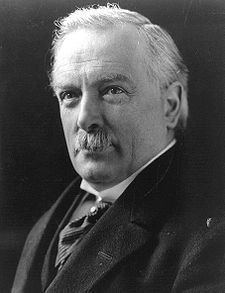 |
6 June 1916 | 5 December 1916 | Liberal Liberal Party (UK) The Liberal Party was one of the two major political parties of the United Kingdom during the 19th and early 20th centuries. It was a third party of negligible importance throughout the latter half of the 20th Century, before merging with the Social Democratic Party in 1988 to form the present day... (Coalition) |
|
| The Earl of Derby Edward Stanley, 17th Earl of Derby Edward George Villiers Stanley, 17th Earl of Derby KG, GCB, GCVO, TD, PC, KGStJ, JP , known as Lord Stanley from 1893 to 1908, was a British soldier, Conservative politician, diplomat and racehorse owner. He was twice Secretary of State for War and also served as British Ambassador to... |
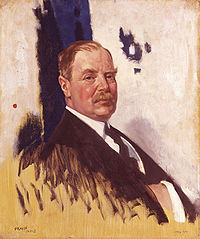 |
10 December 1916 | 18 April 1918 | Conservative Conservative Party (UK) The Conservative Party, formally the Conservative and Unionist Party, is a centre-right political party in the United Kingdom that adheres to the philosophies of conservatism and British unionism. It is the largest political party in the UK, and is currently the largest single party in the House... (Coalition) |
|
| The Viscount Milner Alfred Milner, 1st Viscount Milner Alfred Milner, 1st Viscount Milner KG, GCB, GCMG, PC was a British statesman and colonial administrator who played an influential leadership role in the formulation of foreign and domestic policy between the mid-1890s and early 1920s... |
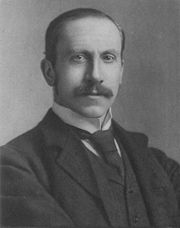 |
18 April 1918 | 10 January 1919 | Conservative Conservative Party (UK) The Conservative Party, formally the Conservative and Unionist Party, is a centre-right political party in the United Kingdom that adheres to the philosophies of conservatism and British unionism. It is the largest political party in the UK, and is currently the largest single party in the House... (Coalition) |
|
| Winston Churchill Winston Churchill Sir Winston Leonard Spencer-Churchill, was a predominantly Conservative British politician and statesman known for his leadership of the United Kingdom during the Second World War. He is widely regarded as one of the greatest wartime leaders of the century and served as Prime Minister twice... |
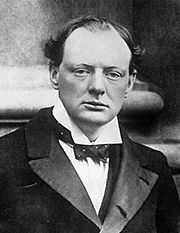 |
10 January 1919 | 13 February 1921 | Liberal Liberal Party (UK) The Liberal Party was one of the two major political parties of the United Kingdom during the 19th and early 20th centuries. It was a third party of negligible importance throughout the latter half of the 20th Century, before merging with the Social Democratic Party in 1988 to form the present day... (Coalition) |
|
| Sir Laming Worthington-Evans, Bt | 13 February 1921 | 19 October 1922 | Conservative Conservative Party (UK) The Conservative Party, formally the Conservative and Unionist Party, is a centre-right political party in the United Kingdom that adheres to the philosophies of conservatism and British unionism. It is the largest political party in the UK, and is currently the largest single party in the House... (Coalition) |
||
| The Earl of Derby Edward Stanley, 17th Earl of Derby Edward George Villiers Stanley, 17th Earl of Derby KG, GCB, GCVO, TD, PC, KGStJ, JP , known as Lord Stanley from 1893 to 1908, was a British soldier, Conservative politician, diplomat and racehorse owner. He was twice Secretary of State for War and also served as British Ambassador to... |
 |
24 October 1922 | 22 January 1924 | Conservative Conservative Party (UK) The Conservative Party, formally the Conservative and Unionist Party, is a centre-right political party in the United Kingdom that adheres to the philosophies of conservatism and British unionism. It is the largest political party in the UK, and is currently the largest single party in the House... |
|
| Stephen Walsh | 22 January 1924 | 3 November 1924 | Labour Labour Party (UK) The Labour Party is a centre-left democratic socialist party in the United Kingdom. It surpassed the Liberal Party in general elections during the early 1920s, forming minority governments under Ramsay MacDonald in 1924 and 1929-1931. The party was in a wartime coalition from 1940 to 1945, after... |
||
| Sir Laming Worthington-Evans, Bt |  |
6 November 1924 | 4 June 1929 | Conservative Conservative Party (UK) The Conservative Party, formally the Conservative and Unionist Party, is a centre-right political party in the United Kingdom that adheres to the philosophies of conservatism and British unionism. It is the largest political party in the UK, and is currently the largest single party in the House... |
|
| Thomas Shaw |  |
7 June 1929 | 24 August 1931 | Labour Labour Party (UK) The Labour Party is a centre-left democratic socialist party in the United Kingdom. It surpassed the Liberal Party in general elections during the early 1920s, forming minority governments under Ramsay MacDonald in 1924 and 1929-1931. The party was in a wartime coalition from 1940 to 1945, after... |
|
| The Marquess of Crewe Robert Crewe-Milnes, 1st Marquess of Crewe Robert Offley Ashburton Crewe-Milnes, 1st Marquess of Crewe KG, PC , known as The Lord Houghton from 1885 to 1895 and as The Earl of Crewe from 1895 to 1911, was a British statesman and writer.... |
 |
25 August 1931 | 5 November 1931 | Liberal Liberal Party (UK) The Liberal Party was one of the two major political parties of the United Kingdom during the 19th and early 20th centuries. It was a third party of negligible importance throughout the latter half of the 20th Century, before merging with the Social Democratic Party in 1988 to form the present day... (National Govt) |
|
| The Viscount Hailsham Douglas Hogg, 1st Viscount Hailsham Douglas McGarel Hogg, 1st Viscount Hailsham PC was a British lawyer and Conservative politician.-Background:... |
 |
5 November 1931 | 7 June 1935 | Conservative Conservative Party (UK) The Conservative Party, formally the Conservative and Unionist Party, is a centre-right political party in the United Kingdom that adheres to the philosophies of conservatism and British unionism. It is the largest political party in the UK, and is currently the largest single party in the House... (National Govt Second National Government 1931–1935 The United Kingdom's National Government was composed of members of the following parties:*National Labour*Conservative Party*Liberal Party*Liberal National Party... ) |
|
| The Viscount Halifax E. F. L. Wood, 1st Earl of Halifax Edward Frederick Lindley Wood, 1st Earl of Halifax, , known as The Lord Irwin from 1925 until 1934 and as The Viscount Halifax from 1934 until 1944, was one of the most senior British Conservative politicians of the 1930s, during which he held several senior ministerial posts, most notably as... |
7 June 1935 | 22 November 1935 | Conservative Conservative Party (UK) The Conservative Party, formally the Conservative and Unionist Party, is a centre-right political party in the United Kingdom that adheres to the philosophies of conservatism and British unionism. It is the largest political party in the UK, and is currently the largest single party in the House... (National Govt) |
||
| Duff Cooper Duff Cooper Alfred Duff Cooper, 1st Viscount Norwich GCMG, DSO, PC , known as Duff Cooper, was a British Conservative Party politician, diplomat and author. He wrote six books, including an autobiography, Old Men Forget, and a biography of Talleyrand... |
 |
22 November 1935 | 28 May 1937 | Conservative Conservative Party (UK) The Conservative Party, formally the Conservative and Unionist Party, is a centre-right political party in the United Kingdom that adheres to the philosophies of conservatism and British unionism. It is the largest political party in the UK, and is currently the largest single party in the House... (National Govt) |
|
| Leslie Hore-Belisha Leslie Hore-Belisha, 1st Baron Hore-Belisha Isaac Leslie Hore-Belisha, 1st Baron Hore-Belisha PC was a British Liberal, then National Liberal Member of Parliament and Cabinet Minister. He later joined the Conservative Party... |
28 May 1937 | 5 January 1940 | National Liberal National Liberal Party (UK, 1931) The National Liberal Party, known until 1948 as the Liberal National Party, was a liberal political party in the United Kingdom from 1931 to 1968... (National Govt; War Govt) |
||
| Oliver Stanley Oliver Stanley Oliver Frederick George Stanley MC, PC was a prominent British Conservative politician who held many ministerial posts before his early death when it was expected he would soon assume higher office.... |
 |
5 January 1940 | 11 May 1940 | Conservative Conservative Party (UK) The Conservative Party, formally the Conservative and Unionist Party, is a centre-right political party in the United Kingdom that adheres to the philosophies of conservatism and British unionism. It is the largest political party in the UK, and is currently the largest single party in the House... (War Govt) |
|
| Anthony Eden Anthony Eden Robert Anthony Eden, 1st Earl of Avon, KG, MC, PC was a British Conservative politician, who was Prime Minister from 1955 to 1957... |
 |
11 May 1940 | 22 December 1940 | Conservative Conservative Party (UK) The Conservative Party, formally the Conservative and Unionist Party, is a centre-right political party in the United Kingdom that adheres to the philosophies of conservatism and British unionism. It is the largest political party in the UK, and is currently the largest single party in the House... (Coalition) |
|
| David Margesson David Margesson, 1st Viscount Margesson Henry David Reginald Margesson, 1st Viscount Margesson PC was a British Conservative politician most popularly remembered for his tenure as Government Chief Whip in the 1930s. His reputation was of a stern disciplinarian who was one of the harshest and most effective whips... |
 |
22 December 1940 | 22 February 1942 | Conservative Conservative Party (UK) The Conservative Party, formally the Conservative and Unionist Party, is a centre-right political party in the United Kingdom that adheres to the philosophies of conservatism and British unionism. It is the largest political party in the UK, and is currently the largest single party in the House... (Coalition) |
|
| Sir P. J. Grigg P. J. Grigg Sir Percy James Grigg PC , better known as Sir P. J. Grigg was a British civil servant who was surprisingly moved from being the Permanent Under-Secretary of State at the War Office to become Secretary of State for War, the political head of the same department during the Second World... |
 |
22 February 1942 | 26 July 1945 | National (Coalition; Caretaker Govt Caretaker Government 1945 The Caretaker Government 1945 was a United Kingdom Ministry, which held office from 23 May 1945 until 26 July 1945, during the latter stages of the Second World War... ) |
|
| Jack Lawson Jack Lawson John James "Jack" Lawson, 1st Baron Lawson PC , was a British trade unionist and a Labour politician. A miner and later Member of Parliament in County Durham, he served in the governments of Ramsay MacDonald and Clement Attlee.-Background:Lawson was born in the port town of Whitehaven, Cumberland,... |
 |
3 August 1945 | 4 October 1946 | Labour Labour Party (UK) The Labour Party is a centre-left democratic socialist party in the United Kingdom. It surpassed the Liberal Party in general elections during the early 1920s, forming minority governments under Ramsay MacDonald in 1924 and 1929-1931. The party was in a wartime coalition from 1940 to 1945, after... |
|
| Frederick Bellenger Frederick Bellenger Captain Frederick John Bellenger was a British surveyor, journalist, soldier and Labour Party politician.-Soldier:... |
 |
4 October 1946 | 7 October 1947 | Labour Labour Party (UK) The Labour Party is a centre-left democratic socialist party in the United Kingdom. It surpassed the Liberal Party in general elections during the early 1920s, forming minority governments under Ramsay MacDonald in 1924 and 1929-1931. The party was in a wartime coalition from 1940 to 1945, after... |
|
| Manny Shinwell |  |
7 October 1947 | 28 February 1950 | Labour Labour Party (UK) The Labour Party is a centre-left democratic socialist party in the United Kingdom. It surpassed the Liberal Party in general elections during the early 1920s, forming minority governments under Ramsay MacDonald in 1924 and 1929-1931. The party was in a wartime coalition from 1940 to 1945, after... |
|
| John Strachey |  |
28 February 1950 | 26 October 1951 | Labour Labour Party (UK) The Labour Party is a centre-left democratic socialist party in the United Kingdom. It surpassed the Liberal Party in general elections during the early 1920s, forming minority governments under Ramsay MacDonald in 1924 and 1929-1931. The party was in a wartime coalition from 1940 to 1945, after... |
|
| Antony Head Antony Head, 1st Viscount Head Antony Henry Head, 1st Viscount Head GCMG, CBE, MC, PC was a British soldier, Conservative politician and diplomat.-Background and education:... |
 |
31 October 1951 | 18 October 1956 | Conservative Conservative Party (UK) The Conservative Party, formally the Conservative and Unionist Party, is a centre-right political party in the United Kingdom that adheres to the philosophies of conservatism and British unionism. It is the largest political party in the UK, and is currently the largest single party in the House... |
|
| John Hare John Hare, 1st Viscount Blakenham John Hugh Hare, 1st Viscount Blakenham OBE, PC, DL , was a British Conservative politician.-Background and education:... |
 |
18 October 1956 | 6 January 1958 | Conservative Conservative Party (UK) The Conservative Party, formally the Conservative and Unionist Party, is a centre-right political party in the United Kingdom that adheres to the philosophies of conservatism and British unionism. It is the largest political party in the UK, and is currently the largest single party in the House... |
|
| Christopher Soames Christopher Soames, Baron Soames Arthur Christopher John Soames, Baron Soames, GCMG, GCVO, CH, CBE, PC was a British politician belonging to the Conservative Party and the son-in-law of Winston Churchill. A European Commissioner and the last Governor of Southern Rhodesia, he had previously been the longtime Member of Parliament... |
 |
6 January 1958 | 27 July 1960 | Conservative Conservative Party (UK) The Conservative Party, formally the Conservative and Unionist Party, is a centre-right political party in the United Kingdom that adheres to the philosophies of conservatism and British unionism. It is the largest political party in the UK, and is currently the largest single party in the House... |
|
| John Profumo John Profumo Brigadier John Dennis Profumo, 5th Baron Profumo CBE , informally known as Jack Profumo , was a British politician. His title, 5th Baron, which he did not use, was Italian. Although Profumo held an increasingly responsible series of political posts in the 1950s, he is best known today for his... |
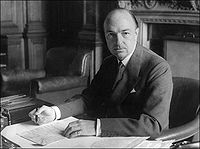 |
27 July 1960 | 5 June 1963 | Conservative Conservative Party (UK) The Conservative Party, formally the Conservative and Unionist Party, is a centre-right political party in the United Kingdom that adheres to the philosophies of conservatism and British unionism. It is the largest political party in the UK, and is currently the largest single party in the House... |
|
| Joseph Godber |  |
27 June 1963 | 21 October 1963 | Conservative Conservative Party (UK) The Conservative Party, formally the Conservative and Unionist Party, is a centre-right political party in the United Kingdom that adheres to the philosophies of conservatism and British unionism. It is the largest political party in the UK, and is currently the largest single party in the House... |
|
| James Ramsden |  |
21 October 1963 | 1 April 1964 | Conservative Conservative Party (UK) The Conservative Party, formally the Conservative and Unionist Party, is a centre-right political party in the United Kingdom that adheres to the philosophies of conservatism and British unionism. It is the largest political party in the UK, and is currently the largest single party in the House... |
|

